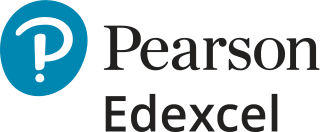
Edexcel is a British multinational education and examination body formed in 1996 and wholly owned by Pearson plc since 2005. It is the only privately owned examination board in the United Kingdom. Its name is a portmanteau term combining the words education and excellence.
The Advanced Extension Awards are a type of school-leaving qualification in England, Wales and Northern Ireland, usually taken in the final year of schooling, and designed to allow students to "demonstrate their knowledge, understanding and skills to the full". Currently, it is only available for Mathematics and offered by the exam board Edexcel.

The International General Certificate of Secondary Education (IGCSE) is an English language based secondary qualification similar to the GCSE and is recognised in the United Kingdom as being equivalent to the GCSE for the purposes of recognising prior attainment. It was developed by Cambridge Assessment International Education. The examination boards Edexcel, Learning Resource Network (LRN), and Oxford AQA also offer their own versions of International GCSEs. Students normally begin studying the syllabus at the beginning of Year 10 and take the test at the end of Year 11. However, in some international schools, students can begin studying the syllabus at the beginning of Year 9 and take the test at the end of Year 10.
The Common European Framework of Reference for Languages: Learning, Teaching, Assessment, abbreviated in English as CEFR, CEF, or CEFRL, is a guideline used to describe achievements of learners of foreign languages across Europe and, increasingly, in other countries. The CEFR is also intended to make it easier for educational institutions and employers to evaluate the language qualifications of candidates for education admission or employment. Its main aim is to provide a method of learning, teaching, and assessing that applies to all languages in Europe.
Cambridge Assessment English or Cambridge English develops and produces Cambridge English Qualifications and the International English Language Testing System (IELTS). The organisation contributed to the development of the Common European Framework of Reference for Languages (CEFR), the standard used around the world to benchmark language skills, and its qualifications and tests are aligned with CEFR levels.
The Association of Language Testers in Europe (ALTE) is an association of language exam providers in Europe.

Cambridge English: Young Learners, also known as Young Learners English Tests (YLE), is a suite of English language tests specially designed for children in primary and lower-secondary school. The tests are provided by Cambridge English Language Assessment.
B1 Preliminary, previously known as Cambridge English: Preliminary and the Preliminary English Test (PET), is an English language examination provided by Cambridge Assessment English.
The TestDaF, formally Test Deutsch als Fremdsprache, is a standardised language test of German proficiency for non-native German speakers. It aims at people who would like to study at, or academics and scientists who want to work in, German universities. The test is run by the TestDaF-Institut.
C2 Proficiency, previously known as Cambridge English: Proficiency and the Certificate of Proficiency in English (CPE), is an English language examination provided by Cambridge Assessment English (previously known as Cambridge English Language Assessment and University of Cambridge ESOL examination).
C1 Advanced, previously known as Cambridge English: Advanced and the Certificate in Advanced English (CAE), is an English language examination provided by Cambridge Assessment English (previously known as Cambridge English Language Assessment and the University of Cambridge ESOL examination).
B2 First, previously known as Cambridge English: First and the First Certificate in English (FCE), is an English language examination provided by Cambridge Assessment English (previously known as Cambridge English Language Assessment and the University of Cambridge ESOL examinations).
Trinity College London, established in 1872, is a leading international exam board, publisher and independent education charity. Since 1938 Trinity has been offering English language assessments taken by over 850,000 candidates in over 60 countries each year.
The European Language Certificates are international standardised tests of ten languages.
A2 Key, previously known as Cambridge English: Key and the Key English Test (KET), is an English language examination provided by Cambridge Assessment English.
The EF Standard English Test is a standardized test of the English language designed for non-native English speakers. It is the product of EF Education First, a global language training company, and a team of language assessment experts including Lyle Bachman, Mari Pearlman, and Ric Luecht. EF compares the EFSET's accuracy to the most widely used high stakes standardized English tests: TOEFL, IELTS, and Cambridge International Examinations.
The Cambridge English Scale is a single range of scores used to report results for Cambridge English Language Assessment exams. It was introduced in January 2015, with Cambridge English Scale scores replacing the standardised score and candidate profile used for exams taken pre-2015. The scale aims to provide exam users with more detailed information about their exam performance than was previously available.
The Michigan English Test (MET) is a multilevel, modular English language examination, which measures English language proficiency in personal, public, occupational and educational contexts. It is developed by CaMLA, a not-for-profit collaboration between the University of Michigan and the University of Cambridge and has been in use since 2008.
Cambridge English Qualifications are a graduated series of exams designed to assess competency in English for learners of English as a second or foreign language. The Cambridge English Qualifications are based on the candidate's scoring on the Cambridge English Scale which is a single range of scores used to report results for Cambridge English Language Assessment exams. It was introduced in January 2015, with Cambridge English Scale scores replacing the standardised score and candidate profile used for exams taken pre-2015. The scale aims to provide exam users with more detailed information about their exam performance than was previously available.


